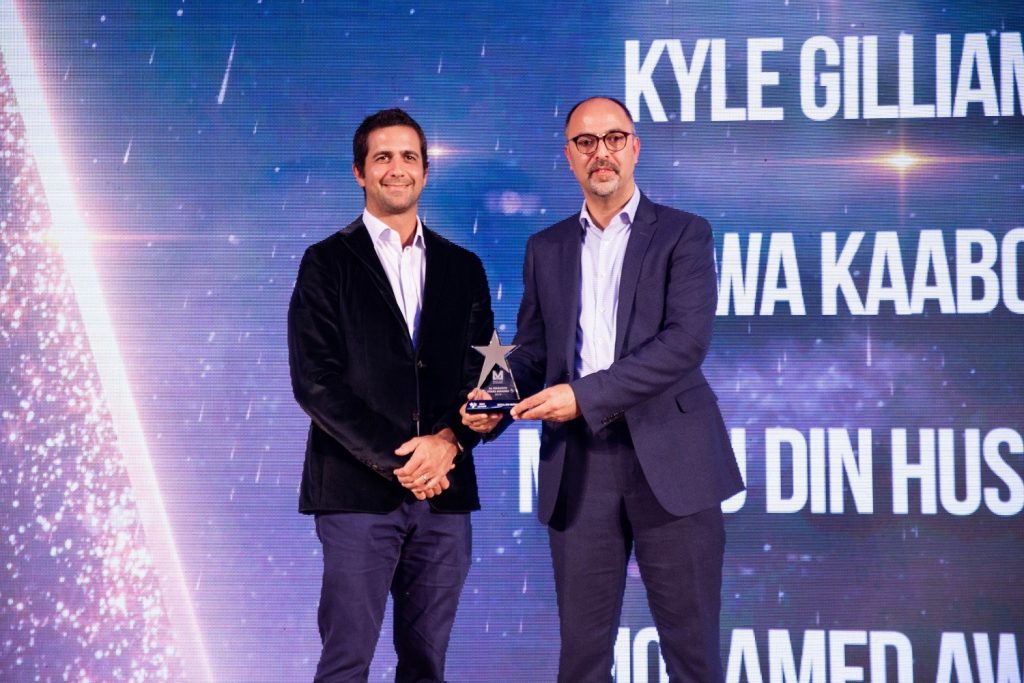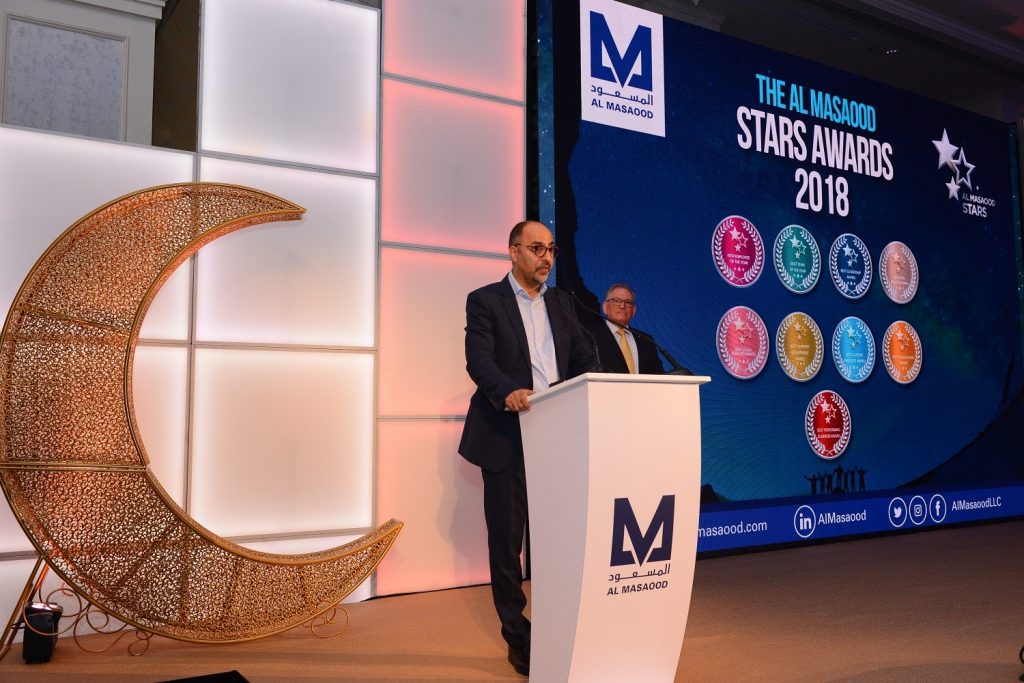Interviewer: Mariham Magdy
“An open and progressive business organizational culture is described as having a healthy work environment where employees feel valued and are recognized as fundamental to the success of an organization” Meiraj Hussain
Brief Biography about the Interviewee:
Meiraj Hussain, Head of Corporate Support and Group HR
Meiraj Hussain joined Al Masaood as Group Head of Human Resources in 2017, bringing over 20 years of professional experience as HR Leader across multiple industries such as Automotive, FMCG, Manufacturing, IT, Services, Real Estate, and Trading. Prior to joining Al Masaood, Meiraj has managed the Human Resources function in both multinational corporations and family-owned businesses across UK, Europe, and the Middle East.
In his current role, Meiraj places great emphasis on talent management, employee-experience, high-performance culture, and leadership excellence development. He is an advocate of building a progressive work culture where trust is the backbone of relationships and creating a workplace wherein employee empowerment and engagement plays a crucial role. Meiraj strongly believes in the digitization of systems and processes, thus, leading to better business results. Moreover, Meiraj has played an extensive role in the Emiratization initiative with the Ministry of Human Resources & Emiratization (MoHRE) to ensure top-tier UAE Nationals are recruited and retained within Al Masaood, consequently resulting Al Masaood to become a proud Platinum Partner with MoHRE.
HR Revolution Middle-East Magazine: Meiraj welcome to HR Revolution Middle East, we are so happy to make this interview with you. You have extensive experience in different industries such as automotive, FMCG, manufacturing, IT, services, real estate, and trading in both multinational corporations and family-owned businesses across the UK, Europe, and the Middle East. How does HRM differ according to the industry, and also according to the business type (multinational corporations and family-owned businesses)?
Meiraj Hussain: Across industries, Human Resources Management (HRM) is a critical part of business operations that focuses on unleashing the people’s best potentials and building a work culture where employees can truly flourish. From process improvement and employee experience enhancement to talent management and performance, HR professionals, as a success partner and enabler, play a diverse role in any organization regardless of business type.
The difference, however, lies in organizational culture. While multinationals have robust policies and processes in place, local family-owned companies are often more agile and faster in implementing the best practices.

HR Revolution Middle-East Magazine: Meiraj, I loved so much this statement in your bio: “He is an advocate of building progressive work culture.” How can we build a “progressive work culture?” What advice would you share with other HR professionals about that?
Meiraj Hussain: An open and progressive business organizational culture is described as having a healthy work environment where employees feel valued and are recognized as fundamental to the success of an organization. All workers have so much to offer and contribute, but, oftentimes, they are constrained by internal dynamics, poor leadership, and weak policies designed to create “carbon copies” instead of celebrating and unleashing individual ideas and potentials. Another equally important feature of progressive work culture is employee engagement. As humans, we can easily lose our motivation, which translates to poor performance and low productivity in the workplace. In such a case, HR professionals can steer the employees back to the path of motivation and engagement by taking quick and corrective actions that effectively address employee sentiments and issues.
HR Revolution Middle-East Magazine: Digital disruption is one of the most important challenges facing organizations nowadays. To what extent shall organizations shift to the digitization of work processes? How would this lead to better business results? What considerations shall they take in this transformation process?
Meiraj Hussain: At this age and time, digitalization is considered a business enabler. It is for this reason that businesses should consider transforming through automation their time-consuming and mundane processes. By freeing their employees from doing repetitive tasks, they can shift their attention to business-critical tasks such as in the areas enhancing customer experience and driving revenue. For the HR department, the staff can focus their time on core areas of performance, leadership, employee development and people support.
HR Revolution Middle-East Magazine: Employee engagement is always an important topic among HR leaders worldwide. Would you share with us how Al Masaood can use its strategy as a tool to empower the employees and engage them in its success journey?
Meiraj Hussain: Communication is the backbone of employee empowerment and engagement. As such, we consider it important to know the sentiments of our employees so that the management can act and address them accordingly. We measure employee sentiments through surveys regularly conducted at the business unit and corporate support levels. Additionally, through the joint efforts of the HR department and the Marketing and Communications office, Al Masaood’s strategy, organizational viewpoints and milestones, and challenges are communicated to the employees across departments to provide clarity about their role and impact on the organization’s success under the guidance of their respective managers and leaders.

HR Revolution Middle-East Magazine: Meiraj, you played an extensive role in the Emiratization initiative of the Ministry of Human Resources & Emiratization (MOHRE). Can you walk us through the Emiratization initiatives Al Masaood has recently taken?
Meiraj Hussain: In response to the directives of the country’s wise leaders and as per the decision of its Board of Directors, Al Masaood has fully expressed its strong support for the Emiratization initiative. More and more Emiratis continue to join our employees of different nationalities. Al Masaood’s Emiratisation program comprises four main pillars: the Internship program, the Functional Training program, the Scholarship Program, and Job opportunities; which all aim to enhance the skills of university students, fresh graduates, and experienced Emiratis, and equip them with the required competencies across business units and corporate support departments. Our Emiratization journey has begun two years ago, starting with offering UAE nationals internship opportunities and training programs. We have also ramped up our recruitment drives in universities as well as formed partnerships with vocational institutes such as Abu Dhabi Vocational Education and Training Institute (ADVETI) to advance the employment of Emirati youth. The UAE Government’s measure to close the salary gap between the public and private sectors is a major boost to our Emiratization efforts as well. In recognition of the intensified Emiratization initiatives across the Al Masaood Group, we have achieved the Platinum Partner status given by the MoHRE. Rest assured that we will continue to recruit local talents, invest in their skills development, and provide them with opportunities for growth in a progressive and fast-paced work environment.
HR Revolution Middle-East Magazine: Meiraj, you wrote a series of very interesting articles, posted on your LinkedIn profile. One of the controversial articles you wrote is “The Inglorious 6 – HR Types to Avoid.” What made you write this article? What important traits shall HR professionals have, on the contrary, from your point of view?
Meiraj Hussain: “The Inglorious- 6” article went viral and I received comments and feedback from global HR thought leaders. The article uses humor to identify some of the common pitfalls HR leaders should avoid.
HR, as a profession, is going through an identity crisis and, unfortunately, many professionals may not make it through in the course of this transformation. HR is an art and it’s understood through practice; HR is learned through doing and mentorship. Further, there is an unclaimed territory in organizations that other corporate support functions are not addressing. This territory can be claimed by HR.
But the biggest enemy facing HR today is mediocrity. It could be mediocrity of people, leadership or processes, which, in turn, leads to the mediocrity of performance and business results. Leaders need to determine the high standards that their respective organizations should adhere to for them to compete successfully in their markets. This is because consumers are now less and less forgiving of companies that deliver average value in terms of experience and engagement.
HR Revolution Middle-East Magazine: Finally, what should be the focus of HR initiatives in organizations nowadays?
Meiraj Hussain: HR initiatives should be in sync with the company’s overall growth strategy. Once this is clear, the implementation plan can be developed. The initiatives can cover talent and leadership; training and development; processes and technology; performance; culture; and talent acquisition and management, among others. The major consideration in executing these initiatives is to identify how they support the leadership in its efforts to attain the vision of the organization. It is important to note as well that HR acts as the voice of reason with leaders. It should be able to challenge management decisions and resolve conflict for the good of all. Moreover, HR is the voice against the hidden enemy of mediocrity.
